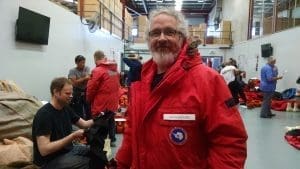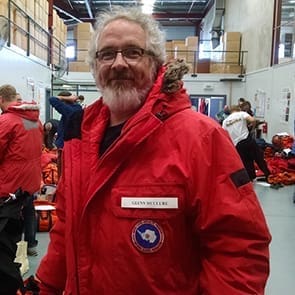John Locke on the Ice
October 23, 2016 McMurdo Station
Back home at the State University of New York at Geneseo, my Humanities students have been reading John Locke’s Second Treatise on Government. Locke argues for the replacement of the 17th c. British monarchy with a shared government by consent of the people. This represents the raw form of modern democracies. He begins by painting a dutifully optimistic view of human nature. He describes the state of nature in which everyone treats each other reasonably and equally. In this utopian state, humans solve problems with reason and logic, thereby eliminating the need for violence, lies, and greed. If one member has more than another, it is reasonable to share the available resources. There is little need for a police force because everyone is capable of reconciling their differences for the common good. Government and law enforcement exist only for those outliers that are “unreasonable.” It is a place of fundamental equality. Locke used this philosophical “Garden of Eden” to eliminate the gap between the middle of English society and the royal family. It is interesting to point out that Locke does not necessarily promote leveling the gap between the middle of English society and the poor or the slaves. While Locke’s state of nature resembles the God’s creation in the Book of Genesis, he expressly avoids religious overtones by saying that the state of nature functions on humanity’s ability to solve problems with reason and logic, not by divine intervention.

I think Locke would like McMurdo Station. First of all, this community exists for the purpose of scientific inquiry. If you are not a scientist gathering and interpreting data, you are supporting them in this hostile environment. This place is devoted the pursuit of knowledge through the rigors of the scientific method.
Secondly, every individual is fully invested not only in the protecting humans but also the environment. Every day is filled with trainings for both newcomers and veterans on how to remain healthy and safe. Everything from intensive recycling programs and mandatory handwashing at every turn, to conserving water and energy. We encourage these habits back home, but they are mandatory here. For example, it requires an enormous amount of energy and time to simply produce water. Any waste of water threatens access to others and also threatens the scientific mission of the station. The Antarctic Treaty of 1959 lays out strict guidelines for environmental preservation. Any spill of man-made substances is met with extensive documentation and meticulous remediation. Every time a vehicle is used, the driver must check for any leak. If that vehicle drives a mile down the road with a leak, an entire team must retrace that mile to remove any snow tainted by the leak and then send it to the back to New Zealand as hazardous waste. They take this very seriously.
Thirdly, this place requires only a minimal police force. There is one US Marshal here and the Air National Guard. There services are rarely needed. We must remember that the US government provides extensive infrastructure for safety (a fire department, a hospital, a search/rescue team, etc.), administration and funding, so government is present everywhere here. While Locke argued that government’s only role was handling the “unreasonable,” here USAP and NSF provide all that is needed to survive.
 Lastly, this is a place of fundamental equality. Everyone from the scientists to the cooks and mechanics receive the same safety and environmental training. We all have to pass the same physical qualifications to come here. We share living spaces in dormitory housing. We eat together. Everyone wears the same, unmistakable red parka called “Big Red.” The cold threatens everyone equally. Everyone serves to keep each other safe. In this way, McMurdo broadly takes Locke one step further by leveling the community from the director to the janitor.
Lastly, this is a place of fundamental equality. Everyone from the scientists to the cooks and mechanics receive the same safety and environmental training. We all have to pass the same physical qualifications to come here. We share living spaces in dormitory housing. We eat together. Everyone wears the same, unmistakable red parka called “Big Red.” The cold threatens everyone equally. Everyone serves to keep each other safe. In this way, McMurdo broadly takes Locke one step further by leveling the community from the director to the janitor.
This is no utopia. McMurdo is not immune to downside of our nature, especially as the season drags on into February/March. However, I believe that this is still a pretty good, practical example of Locke’s optimistic view of humanity. It demonstrates our capacity to live together in a reasonable community and to commit ourselves to common goals and a common need for protection and friendship.
The irony is not lost on me that while Locke’s state of nature resembles the “tropical” vision of the Garden of Eden, McMurdo is found on the coldest place, most barren place on the planet.

